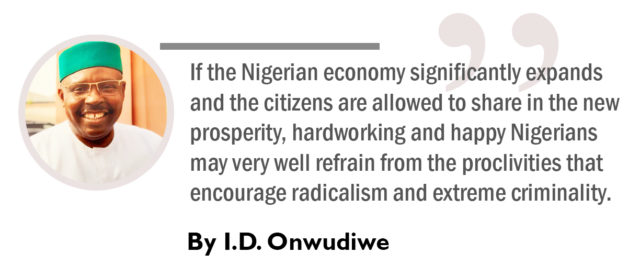The dilemma facing Nigeria today might not be rooted, as many believe, solely, in the management of her state of affairs, but also her avowed colonial quiddity. For Nigeria to realize her standing locus in the world, she must, first, extricate herself from the doom sustained and maintained from an ethos of colonial dependency. There must, therefore, be an effort for an overall progressive and decolonization agenda.

If history continues to serve as a guide, Nigeria must be cautious with the drums of ties and addiction on the new pirouetting colonial power. After a 106-year amalgamation of the nation by Briton Fredrick John Dealtry Lugard, that experience still haunts Nigeria. As a consequence of this unstructured and amorphous consolidation, the country’s ingenious and visionary patriarchs warned, in different ways, about the problems that Nigeria is witnessing today.
Dr. Nnamdi Azikiwe, believed, during the height of their era, in a united Nigeria; however, in 1964, Dr. Azikiwe supported the idea of a peaceful restructuring of Nigeria.
Indeed, in 1948, before Nigeria’s independence from England, the illustrious Sir Abubakar Tafawa Balewa, Nigeria’s first Prime Minister, noted the problem of mingling people of different cultures and religions together to constitute one political entity in the name of a nation as a “British invention.” Prime Minister Balewa’s contemporary, and astute politician, Dr. Nnamdi Azikiwe, believed, during the height of their era, in a united Nigeria; however, in 1964, Dr. Azikiwe supported the idea of a peaceful restructuring of Nigeria. Perhaps an oft-quoted dictum that illustrates the issue well was cogently articulated by another celebrated son of Nigeria, Chief Obafemi Awolowo. He, in 1947, asserted that “Nigeria is not a nation. It is a mere, geographic expression.”
Reliance upon corrupt foreign powers for everything short of the kitchen sink is a recipe for disaster.
Because it has yet to yield to the clarion call of its political forefathers, Nigeria continues to subsist, primarily, as an embryonic nation. Walter Rodney demonstrated that, even though Europe controls many underdeveloped nations in Africa, these countries would evolve and progress if they disentangle themselves from colonial dependency. Reliance upon corrupt foreign powers for everything short of the kitchen sink is a recipe for disaster. The COVID-19 virus has demonstrated the requisite confidence in Nigerian inventiveness. Nigerians can no longer bank on international hospitals, technology, and knowledge. They must learn to invest in Nigeria and recognize and support indigenous talent.
One way to accomplish a progressive agenda is for newly elected presidents to fashion and design their programs before even ascending the office of the Executive Presidency. Imagine if Nigeria’s current president could duplicate the late and former U.S. President Dwight Eisenhower’s accomplishment in America by commissioning in Nigeria the construction of interstate highways. Such an achievement would cement his legacy in Nigeria and would be exalted by Nigerian historians and political scientists. Envisage, also, that the next president vows that every household in Nigeria will have a functioning and actionable electricity! Now, with the right roads and electricity, goods and services began to move more freely in Nigeria. This would, mainly, fuel the engine for efficient agricultural production in every region of the country and would include exports to other nations. Both the North and the South, can, in this day and age, better produce healthy rice to feed, not only Nigerians but Africans as a whole.
And there is more!
Yet another individual could become the educational president and another, the water resources president. With a sound education of literate societal and proper water management for all, things may no longer “fall apart” in Nigeria. The country would be “at ease.” If the Nigerian economy significantly expands and the citizens are allowed to share in the new prosperity, hardworking and happy Nigerians may very well refrain from the proclivities that encourage radicalism and extreme criminality.
Leaders ought to be mindful of these issues and maintain and accomplish social reforms for the benefit of humanity.
These few progressive agendas–and there are more to come in this column–would be entirely instrumental in removing Nigeria from the stranglehold of colonial chains. The country’s literacy standards, innovativeness, and self-production in agricultural products, good water, and efficient transportation networks constitute all of the vital components necessary to reverse the insecurity and the tidal wave of problems facing this great nation. Leaders ought to be mindful of these issues and maintain and accomplish social reforms for the benefit of humanity. Such bold transformations enumerated here would, undoubtedly, render Nigeria a spot-on, independent nation.
■ Dr. Onwudiwe, a Professor of Criminology at the Texas Southern University is a columnist with the WAP


